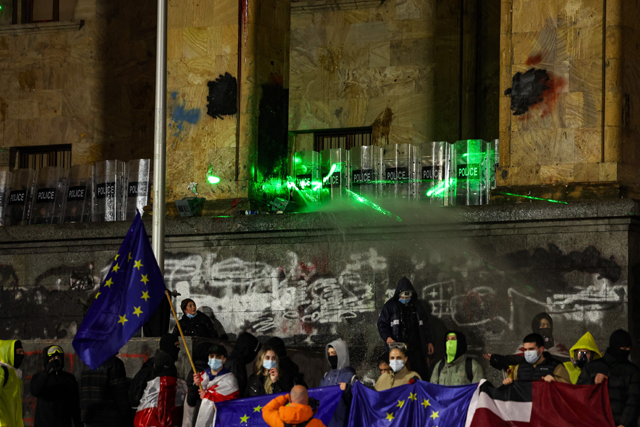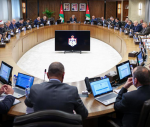You are here
Georgia pro-EU protesters 'standing firm', president says
By AFP - Dec 02,2024 - Last updated at Dec 02,2024

Police form a shield wall and use a water hose while securing the parliament building from protesters during the fifth straight night of demonstrations against the government's postponement of EU accession talks until 2028, in central Tbilisi on Monday (AFP photo)
TBILISI — Georgia's president said on Monday that pro-EU protests involving tens of thousands of people showed no sign of stopping after police fired water cannon and tear gas on a fourth night of demonstrations.
The Black Sea nation has been rocked by turmoil since the governing Georgian Dream Party claimed victory in October 26 parliamentary elections that the pro-European opposition said were fraudulent.
More rallies were planned on Monday and strikes and other protests also started. Ukraine joined countries that have condemned the government crackdown on rallies that has left injuries and arrests.
"Another powerful night of Georgians standing firm to defend their constitution and their European choice," President Salome Zurabishvili posted on X.
"The determination in the streets shows no signs of stopping!" the pro-EU leader wrote.
Troubles deepened after Prime Minister Irakli Kobakhidze announced Thursday that Georgia was shelving accession talks with the European Union until 2028. There has been a wave of protests in the capital, Tbilisi, and other cities.
Kobakhidze further angered protesters Sunday by ruling out new elections, saying "the formation of the new government based on the October 26 parliamentary elections has been completed".
The opposition is boycotting the new parliament, and Zurabishvili has asked the constitutional court to annul the election result, declaring the new parliament and government "illegitimate".
Critics accuse Georgian Dream, in power for more than a decade, of having steered the country away from the European Union and moving closer to Russia, an accusation it denies.
Russia on Monday defended the crackdown on protesters, with Kremlin spokesman Dmitry Peskov saying authorities are taking "measures to stabilise" the situation, accusing protesters of trying to "stir up" unrest.
Russia sees "the most direct parallel" with Ukraine's "Maidan" protest that ousted a Kremlin-backed leader in 2014 after he suspended talks on closer EU ties, Peskov said.
Tens of thousands rallied outside parliament in Tbilisi on Sunday waving European and Georgian flags.
Some demonstrators threw fireworks and stones at riot police, while others built barricades from dustbins and set them ablaze.
During the night, riot police moved in using tear gas and water cannon to disperse the crowds.
Dozens have been injured since Thursday including demonstrators, police and journalists, according to officials and activists, though the exact numbers were unclear.
'Systematic beatings'
Zurabishvili said on Monday that those detained by police "have been subjected to systematic beatings" after arrest.
The "majority of the arrested protesters have injuries to their heads and faces, broken face bones, eye sockets, open wounds," she said.
The leader of the opposition United National Movement party, Levan Khabeishvili, told journalists he was attacked by around 15 masked police attempting to detain him but managed to escape with the help of protesters.
The interior ministry said Monday that 21 police were injured.
Some police suffered "dangerous injuries", health minister Mikheil Sarjveladze said, accusing protesters of throwing "heavy metal objects".
The interior ministry said 224 people have been detained during the rallies.
More protest rallies are planned on Monday in Tbilisi and other cities, the interior ministry said.
Monday also saw strikes break out in protest at companies and educational institutions, national media reported.
"After universities, it is the turn of schools to express their solidarity with the protests, all over Georgia," Zurabishvili said.
Lasha Matishvili, a 35-year-old sociology professor, told AFP he would go on strike Monday in a "symbolic act of resistance".
Ukraine's foreign ministry said it "strongly condemns" the Georgian government's use of force that would lead to "consequences".
Brussels has not recognised the outcome of the October elections, and demanded an investigation into "serious electoral irregularities".
The European Parliament has called for a re-run and for sanctions against top Georgian officials, including Kobakhidze.
Constitutional law experts have questioned the legitimacy of the new parliament.
Earlier last week, Georgian Dream nominated a far-right former football international, Mikheil Kavelashvili, to replace Zurabishvili in the largely ceremonial post of president.
But Zurabishvili told AFP in an interview on Saturday that she would not step down until new parliamentary elections are held.
Related Articles
TBILISI — At least 30,000 protesters took to the streets of Georgia for a third day running Thursday despite the ruling party's promise to d
TBILISI — Violent clashes erupted on Saturday outside Georgia’s parliament between police and demonstrators protesting the government’s deci
TBILISI — Georgia's new parliament convened for its first session on Monday amid protests over an election the opposition says was rigged an



















